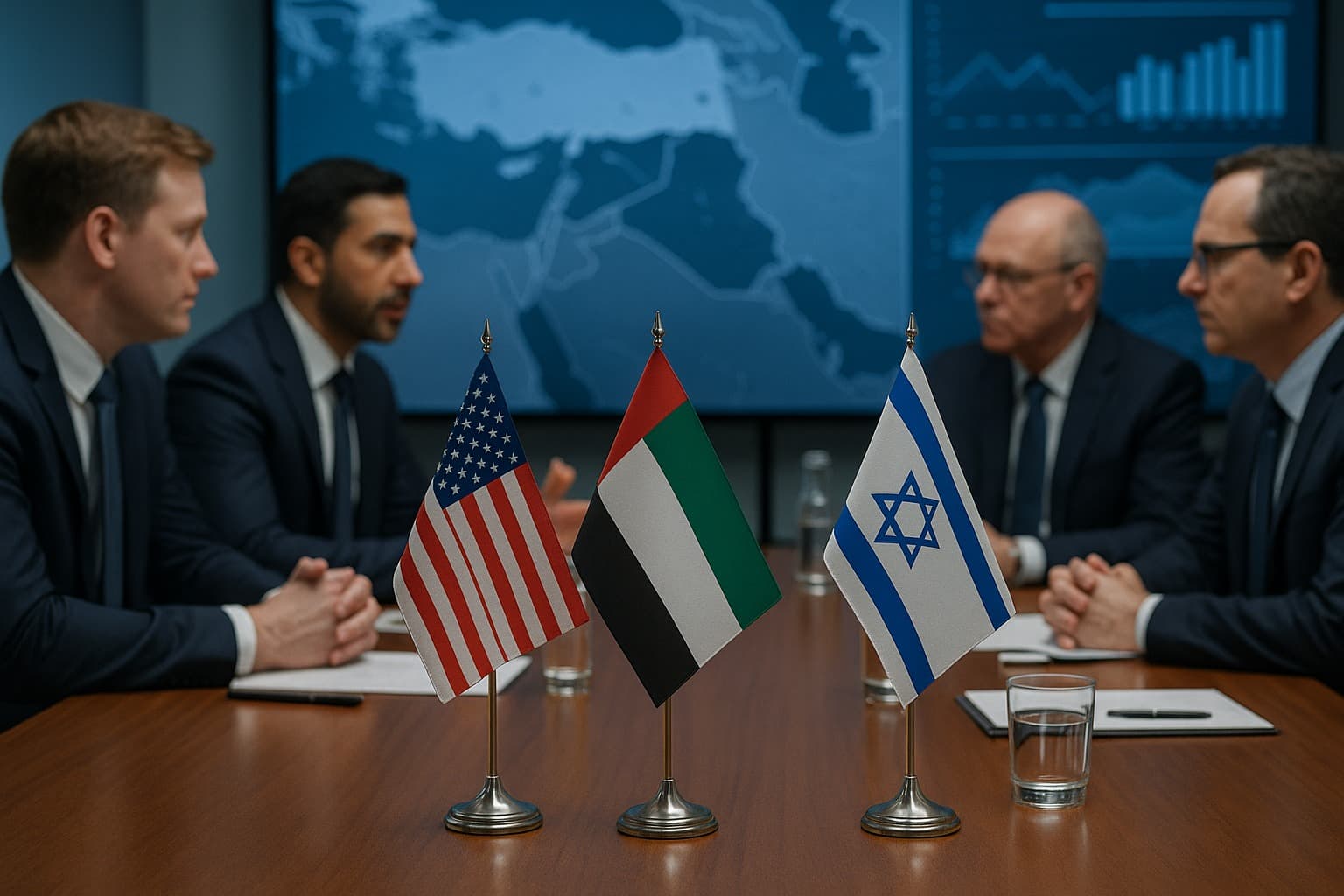Donald Trump Appoints Steven Witkoff as Middle East Envoy: A Blend of Business and Politics
Summary
Donald Trump appointed real estate mogul Steven Witkoff as Middle East envoy, blending business and politics in his 2025 foreign policy. This unconventional choice emphasizes economic partnerships and deal-making in U.S.–Middle East relations.

Introduction
In a significant geopolitical and business development, Donald Trump has appointed real estate billionaire Steven Witkoff as the Middle East envoy in his new administration. The decision comes shortly after Trump’s election win, sparking global conversations about the direction of his foreign policy in 2025.
Witkoff, a renowned name in the world of real estate, now steps into the diplomatic arena, creating a unique mix of business acumen and political responsibility. This move is seen as part of Trump’s strategy to strengthen international ties while incorporating trusted business leaders into high-stakes political roles.
Who Is Steven Witkoff?
Steven Witkoff is a New York–based real estate billionaire known for his successful ventures in luxury hotels, residential complexes, and commercial properties. As the founder and chairman of the Witkoff Group, he has overseen some of the most iconic real estate projects in the United States.
Witkoff’s background includes:
Major Developments: High-end hotels, luxury condominiums, and commercial towers in New York, Miami, and Las Vegas.
Business Approach: A reputation for calculated risk-taking and sharp investment strategies.
Personal Ties: A long-time ally of Donald Trump, sharing a strong bond rooted in the real estate industry.
With his deep experience in negotiations, large-scale deals, and global partnerships, Witkoff brings a business-driven mindset to his new diplomatic role.
Why Did Donald Trump Choose Steven Witkoff?
The decision to appoint Steven Witkoff as Middle East envoy is consistent with Trump’s governance style. Trump has often shown a preference for selecting trusted business associates and loyal figures for key positions rather than relying solely on career politicians.
Key reasons behind the choice include:
Trust Factor: Trump and Witkoff share decades of professional respect and friendship.

Business Diplomacy: Trump believes successful entrepreneurs possess negotiation skills that translate into effective diplomacy.
Fresh Perspective: Witkoff, unlike traditional diplomats, may approach Middle East peace talks and economic agreements with a problem-solving, deal-making mentality.
Economic Focus: Trump’s strategy for the Middle East is expected to emphasize trade, investment, and infrastructure partnerships—fields where Witkoff excels.
Donald Trump’s Middle East Strategy in 2025
Trump’s foreign policy in his previous tenure often centered on strengthening ties with Israel, revisiting U.S.–Iran relations, and brokering regional peace deals. With Witkoff’s appointment, the 2025 strategy may take a slightly different turn, focusing on:
Economic Partnerships: Encouraging U.S. investments in Middle Eastern infrastructure, technology, and real estate.
Peace Through Business: Using trade deals and cross-border investments as tools for political stability.
Private-Sector Involvement: Leveraging business leaders and investors to support diplomatic initiatives.
This combination of politics and business diplomacy could reshape how the U.S. approaches the Middle East under Trump’s leadership.
The Real Estate Connection in Politics
It is no coincidence that Trump, himself a real estate mogul, selected another real estate tycoon for a high-profile envoy role. Real estate professionals like Trump and Witkoff are known for their sharp negotiation skills, global connections, and ability to manage billion-dollar deals—all qualities valuable in international diplomacy.
By appointing Witkoff, Trump reinforces the idea that business leadership can serve as a foundation for political problem-solving. The global property market, with its need for cross-border cooperation, often parallels international diplomacy, making Witkoff’s expertise particularly relevant.
Global Reactions to the Appointment
The announcement has triggered varied responses across political and business circles:
Supporters applaud the move, suggesting that Witkoff’s practical business approach could bring fresh energy to stalled Middle East negotiations.
Critics argue that appointing a real estate billionaire without prior diplomatic experience could risk oversimplifying the region’s complex issues.
Markets have responded positively, with many analysts predicting potential increases in U.S.–Middle East trade and investment opportunities.
This blend of skepticism and optimism highlights the unconventional yet impactful nature of Trump’s choice.
What This Means for U.S.–Middle East Relations
Steven Witkoff’s role as Middle East envoy could reshape U.S. relations with the region in several ways:
Boost in Business Ties: Expect more focus on joint ventures, real estate, and infrastructure projects between U.S. and Middle Eastern nations.
Fresh Negotiation Style: Witkoff’s approach will likely be deal-driven rather than politically constrained.
Stronger Israel Ties: Continuing Trump’s pro-Israel stance while possibly encouraging broader economic cooperation with neighboring nations.
Global Investor Confidence: Businesses may see this as an opportunity for expanded investment channels between the U.S. and Middle East.
If successful, Witkoff could prove that diplomatic innovation lies in blending economics with politics.
The Symbolism Behind the Appointment
The appointment of Steven Witkoff is symbolic in many ways. It represents:

Trump’s Loyalty: Rewarding long-time allies who share his vision.
Business Over Politics: Highlighting Trump’s belief in deal-making as a diplomatic tool.
New Era Diplomacy: Suggesting that real estate and business tycoons can influence global politics just as strongly as career diplomats.
This symbolism also sends a message to the global community that the Trump administration will prioritize practical, results-oriented solutions over bureaucratic processes.
Challenges Steven Witkoff May Face
While Witkoff’s appointment is groundbreaking, it will not be without challenges. The Middle East remains one of the most complex geopolitical regions in the world.
Political Instability: Ongoing conflicts and tensions could limit economic-focused strategies.
Diplomatic Resistance: Traditional policymakers may resist a business-oriented envoy.
Balancing Roles: Witkoff will need to transition from real estate mogul to global diplomat seamlessly.
Public Perception: He must prove that his appointment is based on competence, not just personal ties with Trump.
How Witkoff navigates these hurdles will determine the success of Trump’s Middle East agenda in 2025.
Conclusion
Donald Trump’s selection of real estate tycoon Steven Witkoff as Middle East envoy is one of the boldest appointments of his new administration. The move blends Trump’s business-first philosophy with his foreign policy strategy, placing economic growth and negotiations at the forefront of international relations.
Whether this approach leads to lasting diplomatic success or stirs controversy, one thing is clear: Trump has once again disrupted conventional politics by putting a business leader at the center of global diplomacy.
As Witkoff takes on this high-stakes role, the world will closely watch how his real estate expertise translates into foreign policy outcomes in one of the world’s most sensitive regions.
100-Word Summary
In 2025, Donald Trump appointed real estate billionaire Steven Witkoff as the Middle East envoy, marking a significant shift in U.S. foreign policy strategy. Witkoff, a long-time Trump ally and successful real estate developer, brings a business-driven perspective to international diplomacy. His appointment highlights Trump’s preference for trusted business leaders over traditional diplomats. The move has sparked mixed reactions, with supporters praising Witkoff’s negotiation skills and critics questioning his lack of political experience. If successful, this decision could reshape U.S.–Middle East relations by emphasizing economic partnerships, trade, and deal-making as tools for peace and stability.
